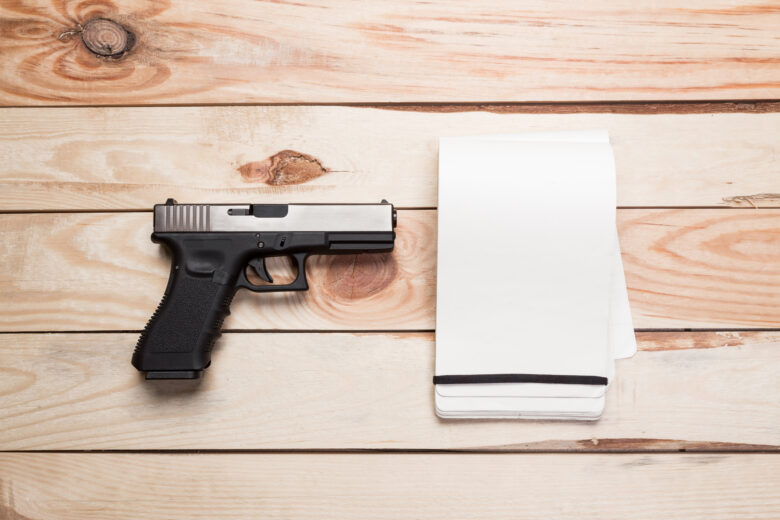
Gun ownership comes with serious responsibilities—especially when it comes to firearms regulated under the National Firearms Act (NFA), such as silencers, short-barreled rifles, or automatic weapons. For many gun owners in North Carolina, a gun trust offers a way to manage these firearms legally and safely, both now and in the future.
Rather than covering the basics, we’ll take a closer look at the pros and cons of using a gun trust to help you decide whether it’s the right choice for your situation. And as with any legal decision, it’s always smart to consult with an experienced estate planning attorney who understands North Carolina laws and federal firearm regulations.
What Types of Firearms Are Typically Involved?
Gun trusts are most often used for firearms and accessories regulated under the National Firearms Act (NFA). These include:
- Silencers (suppressors)
- Short-barreled rifles or shotguns
- Machine guns (manufactured before 1986)
- Certain types of destructive devices
Because these weapons are more strictly regulated than typical firearms, their purchase, use, and transfer involve more legal oversight—making estate planning even more important.
Pros of Using a Gun Trust in North Carolina
A gun trust offers several legal and practical advantages for North Carolina gun owners, particularly those with NFA-regulated firearms or valuable collections. Here are the key benefits:
1. Shared Legal Ownership
One of the biggest advantages of a gun trust is the ability to list multiple people as trustees, giving them legal access to the firearms. Without a trust, only the registered owner may lawfully possess the item. If a family member or friend uses the item without being registered, they could face serious criminal charges.
With a gun trust, co-trustees can be added (as long as they’re legally allowed to possess firearms), helping avoid accidental violations.
2. Simplified Transfers After Death
When you pass away, a gun trust can simplify the process of transferring ownership. Because the trust, not an individual, owns the firearms, there’s no need to include them in your personal probate estate. That means fewer delays, less court involvement, and more privacy for your loved ones.
This also helps avoid situations where your heirs unknowingly take possession of an NFA firearm before receiving approval from the Bureau of Alcohol, Tobacco, Firearms and Explosives (ATF), which is illegal.
3. Privacy
Unlike a will, which becomes a public document during probate, a trust stays private. That means the details of your firearms collection—and who receives them—are kept confidential. For collectors or anyone concerned about privacy, this can be an important benefit.
4. Long-Term Flexibility
A gun trust can continue to exist even after your death. This allows firearms to remain under trust ownership and be managed by future trustees. It’s a good solution for those who want to pass down heirlooms or maintain a family collection over generations.
You can also structure the trust to allow for future additions or changes, such as adding or removing trustees, changing beneficiaries, or updating instructions as laws evolve.
5. Avoiding Certain Application Requirements
In the past, individuals applying to purchase NFA firearms had to go through a more rigorous application process than trusts. While ATF rule changes have closed some of that gap, a trust can still help streamline certain aspects of the application and registration process—especially for families or gun clubs who want shared legal access.
Cons of Using a Gun Trust in North Carolina
While there are clear advantages, gun trusts aren’t perfect for everyone. They come with some drawbacks that are important to understand before moving forward.
1. Initial Setup Cost
Setting up a proper gun trust isn’t free. While online templates exist, they often miss key details or fail to comply with North Carolina and/or Federal law. A well-drafted trust created by an attorney will cost more upfront, but it’s usually worth the investment to avoid legal mistakes down the road.
2. Ongoing Legal and Maintenance Requirements
Once your trust is in place, it needs to be maintained. If you want to add or remove trustees, update beneficiaries, or keep up with changes in firearm laws, you’ll need to stay on top of the paperwork. Failure to do so could result in unintended violations of state or federal law.
For example, if a new trustee is added but never completes the required ATF background checks on subsequent firearm applications with ATF, that person may not legally possess the firearms—even if your trust says they can.
3. Not a Substitute for Responsible Ownership
A gun trust does not eliminate your responsibility as a gun owner. Every trustee must still follow all state and federal laws, and any violations—such as unlawful possession or misuse—can still carry serious consequences. The trust is a tool, not a shield.
4. ATF Rules Can Change
Federal gun laws, especially those involving the ATF, can and do change. What works well today might require updates tomorrow. For example, past rule changes have affected how trusts apply for new NFA items, and future regulations could impact how trusts are managed or interpreted.
Because of this, it’s important to work with an attorney who stays informed about changes in the law and can help you adjust your trust as needed.
Is a Gun Trust Right for You?
For North Carolina gun owners—especially those with NFA items or large collections—a gun trust can offer peace of mind, legal protection, and long-term flexibility. But it’s not a one-size-fits-all solution. The decision depends on your goals, the types of firearms you own, and how you want them managed or passed down.
An estate planning attorney in Charlotte, NC with experience in firearms law can help you decide whether a gun trust makes sense for your situation, and ensure it’s set up properly from the start.
Contact a Charlotte Estate Planning Lawyer Today
A gun trust can be a powerful tool for responsible gun owners in North Carolina. It offers advantages like shared ownership, privacy, and a smoother transfer process—but also comes with legal responsibilities and ongoing upkeep.
If you’re thinking about setting up a gun trust, don’t go it alone. At Charlotte Estate Planning, we’ll help you understand your options and stay compliant with the law.
Contact our office today or call 704-766-8836 to schedule a consultation.
View All Blogs






